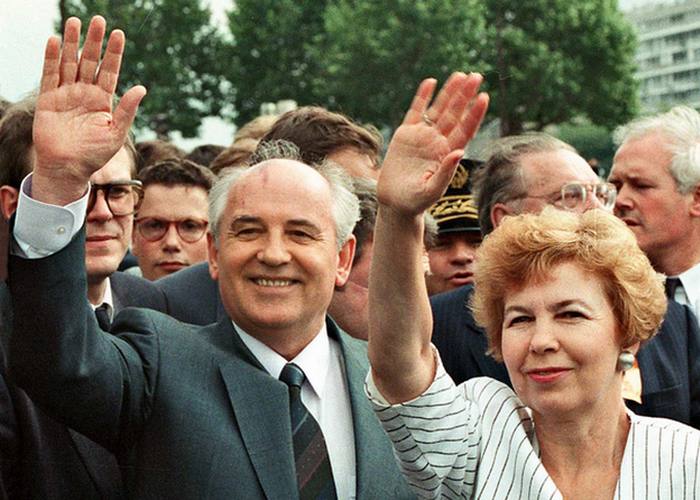A year ago, Mikhail Sergeyevich Gorbachev passed away – the man who gave freedom to hundreds of millions of people in Russia, in the neighbouring countries and throughout Eastern Europe, the man who stopped the Cold War.
Gorbachev made it possible for Soviet citizens, who had been afraid to open their mouths freely, publicly and loudly for decades – on television and in the print media – to say what they think, without fear of execution, prison, dismissal from work, and even expulsion from the party. And this phenomenon was much bigger and broader than freedom of speech, one of the democratic freedoms. It was freedom from fear! Unprecedented for the USSR and an extremely important historical step, which, in fact, changed everything.

Mikhail Sergeyevich Gorbachev with his spouse Raisa Maximovna Gorbacheva during an official visit to France. Paris, 5 July 1989 // Laurent Rebours/AP
The vast majority of Soviet citizens did not even have to fight for this freedom; only a few – brave dissidents – risked in the USSR. However, the full understanding of the opportunity that was given has not come. Russia did not learn to live without fear and did not cope with the freedom it received from Gorbachev – it did not use it for creativity, did not preserve it, did not protect it, did not increase it, and eventually lost it.
In our country, many do not like Gorbachev, they blame him for the collapse of the Soviet empire, without even trying to understand and evaluate his contribution to their lives and possible prospects. And this is definitely an unfair attitude.
After all, the Russians themselves, contrary to Gorbachev’s stand, resignedly accepted the Belovezha Accords in 1991 [the agreement prepared and signed discretely by the leaders of Russia, Ukraine and Belarus declaring that the USSR had effectively ceased to exist and establishing the Commonwealth of Independent States (CIS) in its place as a successor entity], and then one way or another agreed with the illiterate and catastrophic reforms, and supported en masse only Boris Yeltsin and [the leader of the communist party] Gennady Zyuganov [as presidential candidates] in the presidential elections in 1996.
In addition, the absolute majority of Russians have been voting for the ruling party and its faithful allies for the past 30 years, in other words, for the long-term decline in real incomes, for raising the retirement age, for judicial and extrajudicial reprisals, for an authoritarian constitution and irremovable power.
After Gorbachev, Russians could vote differently in federal elections eleven times. It was possible to change the course of events and move towards freedom, truth and justice, follow the path that Gorbachev opened for the country. However, the majority has been continuously making a different choice. Well, that’s the right of the people. But that is also the responsibility.
As a result, we came to what is happening now. And if someone is not happy with something in modern Russia, then one should take offense of himself/herself and his/her neighbours, and not at Gorbachev.
True, on the one hand, it is difficult to talk about Gorbachev because of the many contradictions that accompanied him on the post of the head of the state. But on the other hand, talking about Gorbachev is easy, because the role of this man in history can be described in just two words: hope and chance. Gorbachev gave the people of the Soviet Union hope for a better future and gave them a chance to take a different path. But how we all used this chance is already our question and our responsibility.
After Gorbachev left power, he did not leave Russia, although almost any country in the world would be happy to receive him. If he went to live abroad, all that he did, all the changes that he contributed to, would have a completely different meaning. And I am personally infinitely grateful to Mikhail Sergeyevich also for the fact that he remained in Russia, with his people, until the last day. It was very important and symbolic, because even so Gorbachev kept hope for the future in his country.
And he was also a rare statesman for Russia (especially of such a level and scale), who did not come into contact with corruption in any way. When the Gorbachev Charitable Foundation experienced financial difficulties in the 1990s, Mikhail Sergeyevich did not ask for money from sponsors, but he earned as much as he could, despite his position, age and health.
A year ago, Russia said goodbye to Mikhail Sergeyevich Gorbachev. It was the seventh month of the special military operation. And his passing away during this dark and extremely tragic period for our country was very symbolic.
Gorbachev’s time is gone forever. But the meanings he brought to the history of Russia and the world have been fully confirmed. Therefore, Gorbachev’s legacy is extremely relevant: it is a support and movement into the future – towards freedom and life without fear.
Thanks to Gorbachev, thanks to the fact that in just six years he was able to change not only our country, but the whole world, we must believe in the future even now, in these terrible times, that we still have a chance and that we can finally use it.
Thank you, Mikhail Sergeyevich, for the chance, for the opportunity to see the perspective of a truly free Russia!
May your memory last forever!



